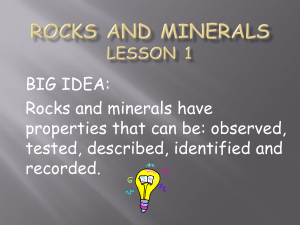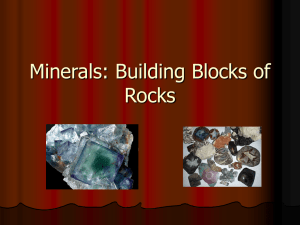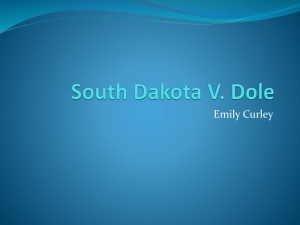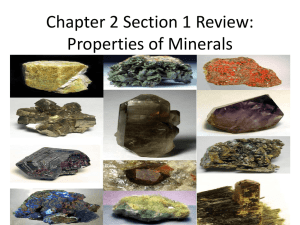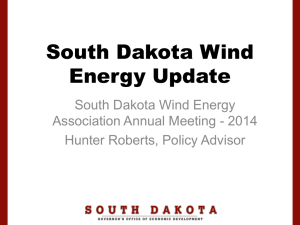Here
advertisement
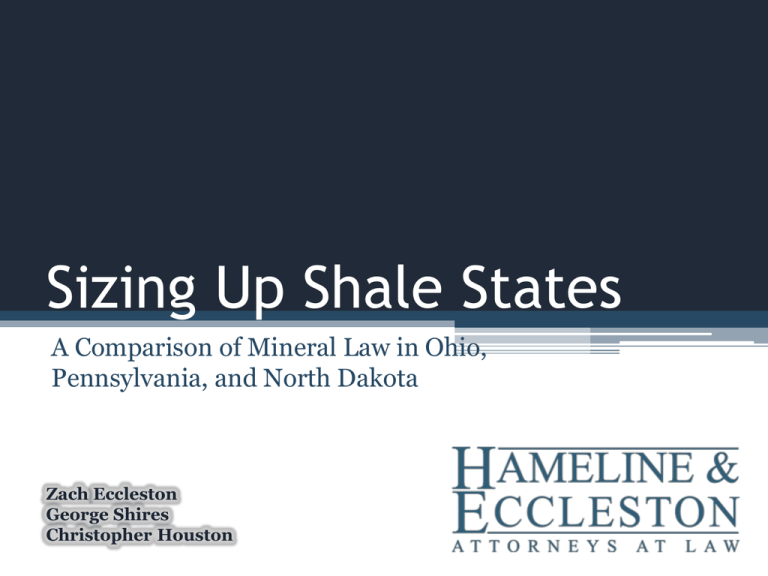
Sizing Up Shale States A Comparison of Mineral Law in Ohio, Pennsylvania, and North Dakota Zach Eccleston George Shires Christopher Houston Shale Plays in the United States State Activity • Ohio ▫ 365 wells drilled in 2011 ▫ Added employment predicted up to 200,000 jobs • Pennsylvania ▫ 2,931 wells drilled in 2011 ▫ Added employment predicted at 180,000 jobs • North Dakota ▫ 2,017 wells drilled in 2011 ▫ Lowest unemployment rate in nation at 3.3% Defining “Minerals” • Ohio ▫ Oil and Gas statutorily defined ▫ “Other minerals” subject to interpretation Case law looks to intent–easement language Detlor v. Holland Defining “Minerals” • Ohio – Detlor v. Holland ▫ “Do hereby grant, bargain, sell, and convey . . . all the coal of every variety, and all the iron ore, fire clay, and other valuable minerals . . .; together with the right . . . of mining and removing such coal, ore, or other minerals; and . . . shall also have the right to the use of so much of the surface of the land as may be necessary for pits, shafts, platforms, drains, railroads, switches, side tracks, etc., to facilitate the mining and removal of such coal, ore, or other minerals, and no more.” Defining “Minerals” • Ohio ▫ Wiseman v. Cambria Products Co., finding “the words ‘other minerals’ and ‘other valuable minerals’ would include petroleum oil.” ▫ Jividen v. New Pittsburgh Coal Co., finding that a “surface only” deed reserving coal and “all other minerals,” but reciting rights specific to mining, such as sinking air shafts and extending switches, reserved oil and gas as well. Defining “Minerals” • Pennsylvania ▫ Dunham Rule ▫ Generally does not include oil & gas ▫ Pending case– Butler v. Powers Estate Marcellus shale gas Using similar case pertaining to coalbed methane Defining “Minerals” • North Dakota ▫ Defined by statute – Oil and Gas Always Minerals ▫ Different for Conveyance/ Reservation and for Lease ▫ Question of which statute applies based on date of instrument Defining Minerals • North Dakota ▫ 1983 – Present Conveyances/reservation – included all minerals except those expressly excluded Leases – only minerals listed by name – regardless of use of the term “other minerals” ▫ Prior Law varies based on date, instrument, and substance Prior to 1955 a conveyance/reservation included coal 1955-1983 a conveyance excluded coal 1955-1975 a reservation included coal See NDMTS 2.04 Regulatory Bodies • Ohio ▫ Highly-centralized regulatory scheme ▫ Division of Oil and Gas Resources Management • Pennsylvania ▫ Department of Environmental Protection ▫ Possible pre-emption on many levels; multiple rules to check • North Dakota ▫ Industrial Commission ▫ Detailed regulatory scheme Hydraulic Fracturing Regulations • Ohio ▫ SB 315– expanded regulation of fracking ▫ Chemical disclosure, water testing • Pennsylvania ▫ Oil and Gas Act reformed by Act 13 ▫ Stricter requirements on fracked wells than on others • North Dakota ▫ Section of Administrative Code ▫ Disclosure, minimum strength & testing standards Title: Records and Recording • Ohio ▫ “Notice” for Deeds and land contracts ▫ “Race” for Leases and Mortgages ▫ But some practitioners interpret statute as “RaceNotice” • Pennsylvania ▫ “Race-Notice” ▫ Uniform Parcel Identifier • North Dakota ▫ “Race-Notice” ▫ Grantor/ Grantee and Tract Indices are required by statute But see Hanson v. Zoller Title: Dormant Mineral Act – Ohio • Enacted 1989; Amended 2006 • Does not apply to coal or government-owned minerals • Minerals reunite with surface after 20 years, absent a “Savings Event” Title: Dormant Mineral Act – Ohio • “Savings Events” defined as… ▫ “Subject” of recorded “Title Transaction” ▫ Actual production by owner or lessee ▫ Use in underground gas storage ▫ Permit issued to the interest holder ▫ Interest holder has filed claim to preserve ▫ Creation of a separate tax number for the minerals Title: Dormant Mineral Act – Ohio • 1989 Act ▫ Self-executing ▫ Ambiguity in 20-year period Likely rolling basis Preserved “indefinitely” by filing “successive” claims But one court has interpreted 20-year period as fixed 1969-1989 ▫ Example: A conveys to B in 1965; B does not record until 1974 Title: Dormant Mineral Act – Ohio • 2006 Amendment ▫ Procedural change Notice and time to claim ▫ New ambiguity If no Savings Event occurred 20 years prior to notice, may the mineral owner still file a Claim to Preserve? Title: Dormant Mineral Act Pennsylvania • Not a true dormant mineral act • 2006 Dormant Oil and Gas Act ▫ Statutory provision for leasing unlocatable mineral owner through trust ▫ “It is not the purpose of this act to vest the surface owner with title to oil and gas interests that have been severed from the surface estate.” Title: Dormant Mineral Act Pennsylvania • Not a true dormant mineral act–yet. • Recent HB 1707 would expand ▫ Allow surface owner to begin petition ▫ Adds possibility of selling the minerals ▫ Would result in a modified dormant mineral act Not self-executing Sale of interest—not necessarily merger with surface estate Title: Dormant Mineral Act – North Dakota ▫ ND also has a Marketable Record Title Act ▫ Termination of Mineral Interest Act Effective 1985; amended 2009 Applies to coal Does not apply to governmental body or agency Creates a mechanism to reunite the minerals with surface after 20-year with no “use” Title: Dormant Mineral Act – North Dakota Reunification of minerals: 1. 20 year period of non-use ▫ Production, storage, subject to recorded instrument, pooled, or a statement of claim is filed 2. Surface Owner gives notice ▫ By three weeks of publication and notice to the address of record owner – if no address use reasonable inquiry to determine address 3. Copy of notice and service recorded with county Clerk Title: Dormant Mineral Act – North Dakota Reunification of minerals: 4. Perfection of title – NDCC 38-18.1-06.1 • A) Follow steps 1-3 above, then institute action in district court for quiet title • B) Court is required to issue findings of fact, conclusions of law, and enter judgment in favor of surface owner • C) Judgment is conclusive and lessee may rely on the judgment – lease remains in effect and lessee is not liable even if judgment is later vacated Dormant Mineral Act – North Dakota Preservation of mineral interest: 1) During 20 year period “use” minerals 2) “Second Chance” - Within 60 days after first publication of notice: ▫ ▫ File instrument demonstrating “use” File a statement of Claim Leasing: From Governmental Bodies • Ohio ▫ Availability based on land classification ▫ New Oil & Gas Leasing Division for state land • Pennsylvania ▫ Difficult; multiple governmental levels with differing requirements and procedures • North Dakota ▫ Important because of state mineral reservations ▫ If advertising and bidding scheme not followed, may void lease Leasing: From Governmental Bodies • North Dakota ▫ Reservation to state by year Prior to 1939: no mineral reservations 1939 – 1941: reservation of 5% minerals 1941 – 1960: reservation of 50% minerals of all lands Even if deed did not expressly reserve minerals 1960 - 1973: reservation of 100% of minerals in grant lands and 50% of minerals in non-grant lands 1973 – present: all minerals reserved in all state land conveyances Leasing: Roads • Ohio ▫ Municipal streets: presumption of fee in city Fee may be “qualified” ▫ County roads and highways: presumed fee in abutting landowner to center of road • Pennsylvania ▫ Generally strip-and-gore • North Dakota ▫ Generally strip-and-gore ▫ Can be altered by statute allowing particular eminent domain act Leasing: Waters & Riparian Rights • Ohio ▫ Abutting owners own to center regardless of navigability • Pennsylvania ▫ Varies based on navigability ▫ Changes in watercourse specifically addressed • North Dakota ▫ Varies based on navigability ▫ Changes in watercourse specifically addressed ▫ Current Litigation Leasing: Concurrent Owners • Ohio ▫ Whether all cotenants are needed is unsettled • Pennsylvania ▫ Leasing from less than all may be trespass ▫ Remedy is partition • North Dakota ▫ Do not have to lease from all co-tenants ▫ Account for share of net profits Leasing: Joint Tenancy • Ohio ▫ Not Recognized–statutory Survivorship Tenancy after 1985 ▫ No common law Four Unities • Pennsylvania ▫ Recognized– Survivorship requires clear intent ▫ Common law Four Unities recognized ▫ Tenancy by the Entireties • North Dakota ▫ Recognized– Defined by Statute ▫ No common law Four Unities; straw man not needed Leasing: Successive Owners • Each require both Life Tenant & Remainderman • Ohio ▫ Method of payment undetermined ▫ Recognizes Open Mine Doctrine • Pennsylvania ▫ Payment method clear ▫ Recognizes Open Mine Doctrine • North Dakota ▫ Payment method clear ▫ Open Mine Doctrine not yet adopted Pooling & Compulsory Pooling • Ohio: ▫ Forced pooling available ▫ Mandatory Unitization also available • Pennsylvania ▫ Only for formations below Onondaga–includes Utica shale ▫ But no Marcellus forced pooling • North Dakota ▫ Forced pooling available ▫ Statutory risk-penalties Maintaining the Lease: Effects of Foreclosure • Pennsylvania & North Dakota are Lien-Theory ▫ Foreclosure wipes out Lessee’s interest ▫ If Mortgage/ lien was filed prior to Lease filing ▫ Get Lease subordinated • Ohio ▫ 2010 Statute ▫ Oil & Gas Lease will not be extinguished by foreclosure and has priority over all prior recorded encumbrances ▫ Basically a massive subordination Maintaining the Lease: Effects of Foreclosure - Ohio • Ohio Issues during Production: Competing Development • Ohio ▫ Well subject to approval if in “coal bearing township” ▫ Spacing provisions • Pennsylvania ▫ Coal Operator right to object ▫ Future wind conflict possible • North Dakota ▫ Policy to develop, but statutory guidance scarce ▫ Possible Kerbaugh application Pending Litigation • Ohio ▫ Anschutz Lease Litigation ▫ Pending Litigation • Pennsylvania ▫ Butler v. Charles Powers Estate Ownership of natural gas found in coal • North Dakota ▫ Landowner suit ownership of minerals between high and low water mark Post-Lease Issues: Lease Termination & Filing Requirements • Ohio ▫ Recording required ▫ Either in margin of lease or separate document • Pennsylvania ▫ Abandonment, if lessee intended such ▫ No statute requiring recording • North Dakota ▫ Recording required ▫ Statutory provisions for lessor voiding abandoned lease
